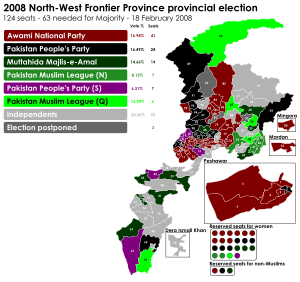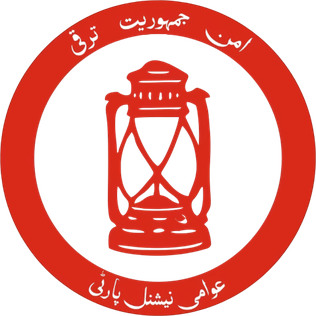
The Awami National Party is a Pashtun nationalist, secular and leftist political party in Pakistan. The party was founded by Abdul Wali Khan in 1986 and its current president is Aimal Wali Khan, great-grandson of Bacha Khan, with Mian Iftikhar Hussain serving as the Secretary-General. Part of the PPP-led cabinet of the Pakistani government during 2008−13, ANP's political position is considered left-wing, advocating for secularism, public sector government, and social egalitarianism.

Khan Abdul Wali Khan was a Pashtun Pakistani democratic socialist politician who served as president of Awami National Party. Son of the prominent Pashtun nationalist leader Abdul Ghaffar Khan, Wali Khan was an activist and a writer against the British Raj like his father.

Asfandyar Wali Khan is a Pakistani politician from Khyber Pakhtunkhwa, currently serving as the president of the Awami National Party (ANP). He is the son of Abdul Wali Khan, the party's founding president.

Ajmal Khan Khattak was a Pakistani politician, writer and Pashto language poet from North-West Frontier Province, who served as the President of Awami National Party. He was a close friend of Khan Abdul Wali Khan.

Muhamad Yusuf Khan Khattak was a Pakistani politician, left-wing intellectual, lawyer, and noted Pakistan Movement activist from Khyber Pakhtunkhwa.
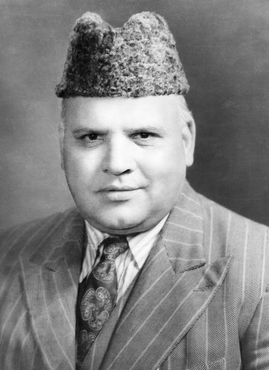
Khan Abdul Qayyum Khan Kashmiri was a major figure in British Indian and later Pakistani politics, in particular in the North-West Frontier Province, where he served as the Chief Minister from 23 August 1947 to 23 April 1953. He also served as the Interior Minister of Pakistan from 1972 to 1977.

The Wali Khan faction of the National Awami Party was formed after the 1967 split in the original NAP between Maulana Bhashani and Abdul Wali Khan. The Wali Khan faction was later named National Awami Party (NAP) after the independence of Bangladesh.

Aftab Ahmad Khan Sherpao is a Pakistani politician who is the current chairman of the centre-left Pashtun nationalist Qaumi Watan Party, after previously being a member of the Pakistan Peoples Party. He was a member of the National Assembly of Pakistan from November 2002 to May 2018.
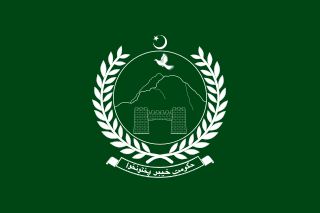
The Provincial Assembly ofKhyber Pakhtunkhwa is a unicameral legislature of elected representatives of the Pakistani province of Khyber Pakhtunkhwa, which is located in Peshawar, the provincial capital. It was established under Article 106 of the Constitution of Pakistan, having a total of 145 seats, with 115 general seats, 26 seats reserved for women and 4 reserved for non-Muslims.

Ameer Haider Khan Hoti is a Pakistani Pashtun politician who was the Chief Minister of Khyber Pakhtunkhwa from 2008 to 2013. During his government, the province was renamed from "North-West Frontier Province" to "Khyber Pakhtunkhwa." Hoti had also been a member of the National Assembly of Pakistan from August 2018 till August 2023 and from June 2013 to May 2018. He is the Senior Vice President of the Awami National Party (ANP).
Arbab Muhammad Zahir was a Pakistani politician who served as Member of the National Assembly of Pakistan from 1990 to 1996 and again from 2008 to 2013. He had been a member of the Provincial Assembly of Khyber Pakhtunkhwa from 1985 to 1988 and again from 1997 to 1999.
Amjad Khan Afridi is a Pakistani politician from Kohat District who thrice served as a member of the Provincial Assembly of Khyber Pakhtunkhwa, from March 2008 to March 2013, from May 2013 to May 2018, and from August 2018 to January 2023.
Sami Ullah Alizai is a Pakistani politician who had been a Member of the Provincial Assembly of Khyber Pakhtunkhwa, from 2008 to 2013 and then again from 2013 to 2018.
Sardar Muhammad Idrees was a Pakistani politician who served as a member of the Provincial Assembly of Khyber Pakhtunkhwa from 2013 to 2018. Previously he had been a member of the Provincial Assembly of the North-West Frontier Province from 2002 to 2007.
Sultan Muhammad Khan is a Pakistani lawyer and politician who served as the Provincial Minister of Khyber Pakhtunkhwa for Law, Parliamentary Affairs and Human Rights, in office from 29 August 2018 to 9 Feb 2021. He resigned from his post willingly to face an inquiry into unfounded and unproved allegations from which he was later cleared by his party. However, despite later requests by the then Chief Minister who visited his residence in Rajjar, Charsadda to invite him to rejoin the cabinet, he refused. Later a jirga led by ANP leader Aimal Wali Khan visited his residence to invite him to join ANP and subsequently he joined the ANP to which he is still affiliated. He had been a Member of the Provincial Assembly of Khyber Pakhtunkhwa from August 2018 till January 2023. Previously, he was a member of the Provincial Assembly of Khyber Pakhtunkhwa from May 2013 to May 2018. As a lawyer he has previously worked for law firms namely “Afridi, Shah & Minallah” and “Orr, Dignam & Co.” Presently he practices law at Peshawar and Islamabad.
Mian Nisar Gul is a Pakistani politician who had been a member of the Provincial Assembly of Khyber Pakhtunkhwa from March 2008 to March 2013 and August 2018 to January 2023.
Liaquat Khan Khattak is a Pakistani politician who served as a member of the Provincial Assembly of Khyber Pakhtunkhwa from October 2018 to January 2023.

Aimal Wali Khan is a Pakistani politician and president of Awami National Party, serving as a member of the Senate of Pakistan since April 2024. He is the son of the former president of Awami National Party, Asfandyar Wali Khan; the grandson of the founder of the party, Abdul Wali Khan; and the great-grandson of the Indian independence activist and founder of the Khudai Khidmatgar movement, Abdul Ghaffar Khan.
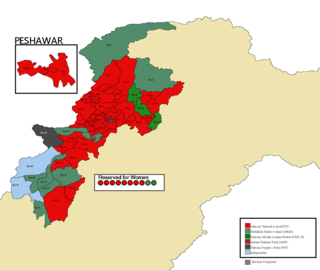
General elections were held in Khyber Pakhtunkhwa on Wednesday, 25 July 2018 to elect the 51 members of 15th National Assembly from Khyber Pakhtunkhwa. The Pakistan Tehreek-e-Insaf (PTI) obtained a landslide victory in the province by winning 37 general seats and increased their margin of victory from 2013. The PTI also won 8 out of 10 reserved seats while the Pakistan Muslim League (N) (PML-N) and Muttahida Majlis-e-Amal (MMA) won 1 reserved seat each.
